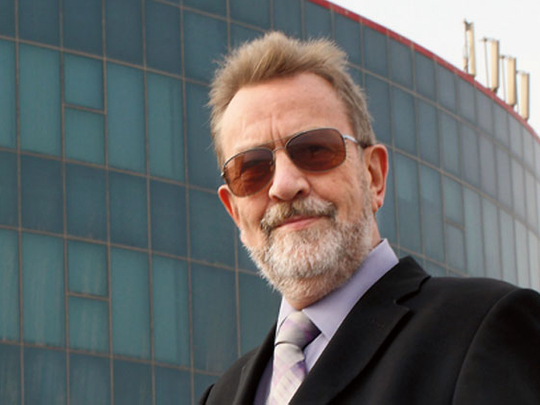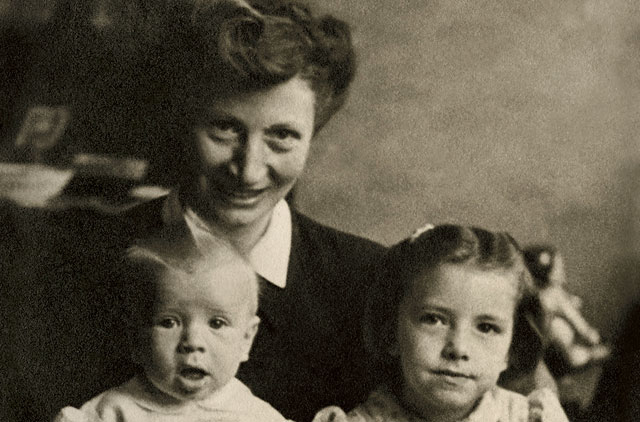
Jeffrey Willis's concern for the environment goes back to his teenage years in England. Back then he used to drive a three-litre gas guzzler because petrol was cheap. Then, in 1974 prices spiralled, and he was forced to get rid of his vehicle.
"What was happening made me think," says Willis, associate director of Arup, a global firm of designers, planners, engineers, consultants and technical specialists, with headquarters in London.
Willis who is also founding member and vice-chairman of the Emirates Green Building Council (EGBC), said: "I began to read quite a bit about this socio-economic phenomenon."
He is a self-confessed admirer of the late Sir Ove Nyquist Arup, a leading Anglo-Danish engineer considered to be one of the foremost architectural structural engineers of his time.
"In order to do the job I do, I need to be a bit of all these: mechanical engineer, leader, manager, scientist, builder, businessman and lobbyist. I have to be prepared with the necessary research or facts to back up our input; like others in my team, I need to have the skills of an influencer - someone who has the data and scientific know-how, can present the material to the stakeholders in the best possible way and make things happen."
With a career spanning 40 years in the construction industry, Willis , who is based in Dubai, has spent 30 years of his professional life working for Arup, having worked in London, Qatar, Berlin, Hong Kong, Indonesia, Singapore and Abu Dhabi.
Ove Arup's goal of "Total Architecture", a process in which a building is the result of democratic teamwork between the engineer and architect, has influenced Willis and all who are familiar with the philosophy behind the genius of Ove Arup whose accomplishments include the Sydney Opera House and Durham's Kingsgate Bridge (in the UK), to name just two.
So what, according to Willis, makes a building "green,"?
"To be totally green, a building has to have a net zero impact on the environment over its lifetime, giving as much back in resources as it takes to construct and operate,'' says Willis. "[However], I like this definition of green: designed to respect the planet's resources without compromising the quality of life in and around the building whilst being affordable to the target income group."
Back in 2005 when Willis first began working in the UAE, there was only one building that was LEED NC (Leadership in Energy and Environmental Design for New Construction) certified: the Pacific Controls HQ Building in Dubai Techno Park which holds a Platinum rating - the highest level in LEED NC certification.
"From that single building, the list of buildings or interior fit-outs in the UAE which carry the badge of being a green building has grown to 29. I am hoping that more businessmen and builders will follow this trend since it will benefit everyone, including the environment," says Willis.
He hates waste and wishes he could change people's mindsets. A lot of people get fixated on certain ideas, he feels, ideas that need to be changed because they are erroneous and dangerous. "Take for example the concept of global warming - in spite of the obvious impact of this on weather conditions around the world, some people still view it as something alien… that it has nothing to do with their lives. They feel that it is someone else's job to fix it."
I
I believe that "every cloud has a silver lining".
I am one of those people who tend to see [a half-filled glass of water] as half full rather than half empty. I'm a very positive, optimistic person. I love saying nothing is impossible because I believe there is always a solution to every problem. I know I am too choosy over detail… I have always been like this - fussy is the word I think. My wife always tells me I am too concerned with even the small things - the finer points.
I can't stop thinking of how wonderful my children are. I am a proud father of two and [love] watching them grow. I am also excited to see what they will grow up to be like.
I easily relate to women… partly because I had two sisters and I was very close to my mum. I've never had any problem regarding women demanding equality.
I find it difficult to talk to people who do not want to learn. It is better to be humble and open… this way, we can learn from each other.
I'm happiest when I've finished doing something well. We put a lot of effort into our undertakings but sometimes they don't get done as well as we want them to.
In the building industry, nearly everyone involved in a project wants things to be done very quickly. It is a good thing that there are checks and balances to minimise mistakes that may have been overlooked. We have people inside who do audits and involve third party assessors as well. We have to always be careful since mistakes in this business are costly and involve, not just structures, but human lives.
I would rather be nothing other than what I am. I am pretty happy with my life, how I turned out to be. I have never wished for anything to be different in my life. Sure, I made mistakes along the way, but I do not see any wisdom in wanting to be something that you are not. If you must change something, work at it. Do something about the present. Don't worry about the things that you can't change for what's done is done. Deal with what is in the best way you can.
Me
Me, my childhood and fascination for clocks: I have always thought I was lucky in my childhood and adolescence - a matter of being born in the right place at the right time to suit the way I was. I liked to make things with my hands and two favourites were repairing and renovating old clocks - the ones that you wind up with a key - and making wooden jewellery out of offcuts, both of which I sold to make extra money. Not a lot of money, but very satisfying for me as a teenager. I think the fascination with clocks was an indicator of my interest in putting together many different parts to make an efficiently operating whole. Buildings are a very big kit of parts - both complex and fascinating.
Me and my education: Born in London, I moved to Hemel Hempstead at the age of three, went to Apsley Grammar School, and did my engineering apprenticeship with Charles Beal, Patterson & Partners in Hemel Hempstead.
I was mostly studying and working at the same time. It is my belief that we never stop being educated even if we do not attend formal classes.
Me and my career specialisation: I always admired the early engineers such as Isambard Kingdom Brunel (a 19th-century leading British engineer.) But my path into building design grew out of my love for technical drawing.
One of my A-levels was in Engineering Drawing, and the process of generating and collecting all the required information, then representing it in pictorial format so it communicated the requirements effectively to others - was very enjoyable.
When I first started work, all the drawings for building construction were drawn using ink pens on tracing paper. I decided to try the building industry because it provided the opportunity to continue with drawing, and there were also good industry opportunities for further education.
Myself
I think we are heading for more regulation and greener outcomes - better buildings.
I think we have to have a change of financial perspective that includes the costs to the environment - green taxes, or something similar - an approach geared towards "cradle to cradle" [sustainable] commerce. I have been involved in the building industry for over 40 years - can't see that changing now.
We need to stop being consumers, stop wasting what we have, and become recyclers.
The responses and actions being done globally when it comes to green buildings are promising, but we need to do more in more parts of the world, much more quickly. The fact that we have 29 green certified buildings in the UAE today is part of the proof that things are changing… and for the better.
The most difficult lesson that I learned while studying to become an engineer was that in order to properly do the bits you really like, you also have to properly do the bits you do not really like.
By the way
One of Willis's favourite structures is the Beddington Zero Energy Development (BedZED) in the UK, "not only because it is green but also because it incorporates a lot of good ideas that we have been able to study in use and are working in conjunction with each other".
Fact: The Emirates Green Building Council (Emirates GBC) is a working organisation formed in 2006 with the goal of advancing green building principles.












